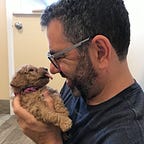Postscript
“I’m so sorry to hear about your father.”
“Thank you doctor. He really liked you,” she said, smoothing her skirt. She always sat like a coiled spring.
In a small exam room it’s hard not to share temperaments, passing them like a bottle in a brown paper bag. Being near her made me guard my gestures and language as closely as she seemed to guard hers.
I don’t mean to say she didn’t have an easy smile. She was pixie-like, despite her age, but not juvenile. But there was a seriousness beneath, and maybe something more. She had been caring for her father for a long time. He had a certain kind of quiet charm still evident in his daughter’s smile, but somehow more genuine in spite of, or maybe because of his failing memory.
He always had her stop and pick up two boxes of cookies on the way to the office, one for the staff, and one just for me. He would hold them on his lap as she pushed him in a wheelchair from the lobby. At home he rarely used even a cane, but in an office building, a chair seemed easier, safer. He wasn’t so steady on his feet.
I think he liked the smile of the woman at the front desk. When he would hand her up a white box tied with a cotton string, she would bend over the front desk, his rheumy eyes innocently gazing past the top of her blouse. The box was closed and tied perfectly, with just a bit of grease on the edge where the baker’s hand had held it. No one closes a box like that anymore. When I see a box like that, I think of the little bakery where my mom bought challah, and the curt old ladies would hand me a dry, crumbly cookie just for being a kid.
He was always in a good mood when I saw him, but his daughter would sometimes hint of troubles at home. He was moody. He was a bit difficult. Nothing specific, but the smile lines around her eyes would seem less genuine when she spoke of home.
They were both frail, really, small-boned, with parchment paper skin. He was slow and quite stooped. When she was still, she was quite still; when she moved she was jerky and quick, like a sparrow but without the grace and humor.
At his age, I didn’t really do much except put a stethoscope to his chest and a hand on his shoulder. Sometimes I would bandage another wound on a shin or elbow, or reassure him about the bruises that occasionally bloomed under his translucent skin. We both enjoyed the visits, I think.
As these things go, the visits finally stopped. We didn’t get any more cookies, but they weren’t that good anyway. But I still got regular visits from his daughter, also my patient.
As she sat on the stool, her aging blouse pressed perfectly, she smiled as we reminisced about her father’s visits, his repeated stories, his flirtations. Soon, though, her face transformed into an expression that better matched her posture: taught, nervous, potential energy barely contained.
“He fell a lot, you know.”
“Yes, I remember. I was amazed how he could laugh about it.”
“You don’t think it’s the falling that killed him, do you?”
“Of course not. He was very, very old. When you get to be a certain age, things just happen.”
She leaned in, her voice dropping, causing me to lean in to hear her.
“If he fell, and maybe someone didn’t pick him up right away, that wouldn’t have killed him, would it, doctor?”
